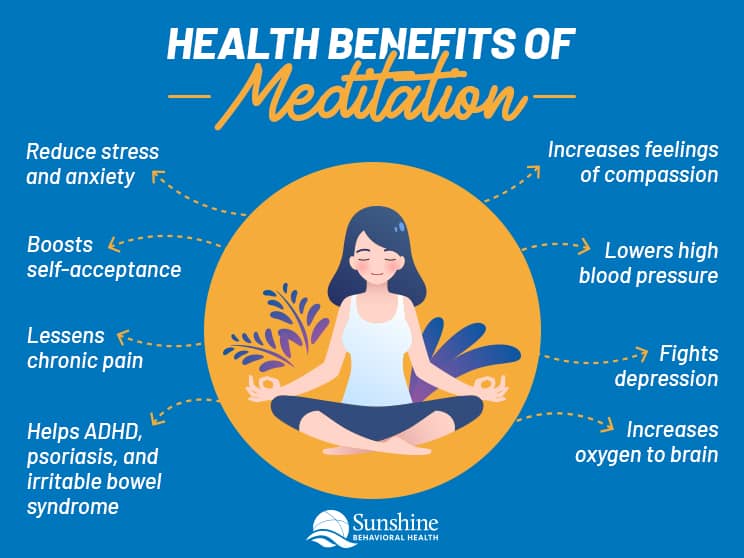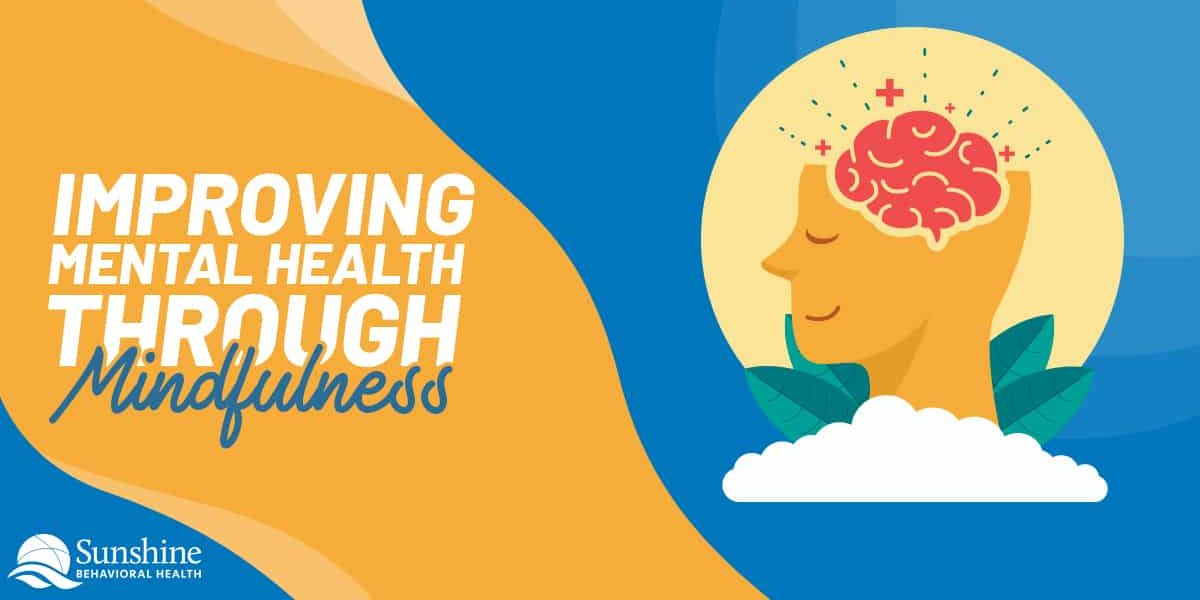Mental health is one of the most pressing issues in health care today. If you have questions or concerns about your overall mental health, you may be interested in something called mindfulness.
Practicing mindfulness can help you manage your stress, balance your emotional state, and clear anxiety from your mind. As a result, you may have an easier time focusing on your tasks, become more productive, and improve your overall quality of life. At the same time, you may be hearing about mindfulness for the first time, wondering how this can help you.
We live in a world that has more pressure than ever before. The lines are often blurred between work and home.
It can be difficult to engage fully in personal and professional obligations. You might be receiving work calls at home even when you are trying to spend time with family members and friends.
Your mind might be always thinking about something, jumping from one task to the next. This can become overwhelming, making it hard for you to fall asleep at night. Even if you do eventually sleep, it may not be quality sleep, so you don’t feel rested when you wake up the next day.
All of this adds up, making it hard to find balance in your life. That is where mindfulness can be helpful. What is mindfulness, and how can you put this to work for you?
What Is Mindfulness?
Mindfulness is all about paying attention to your daily life. Even though you formerly rushed through your daily tasks, mindfulness could encourage you to slow down, pay attention, and allow your mind to focus on each individual task one at a time.
Yoga, meditation, and mindfulness are commonly linked, but you do not necessarily have to spend an hour every day contorting your body into difficult positions to achieve mindfulness. In reality, you already have the tools you need to practice it.
By practicing mindfulness regularly, you may be able to reduce your anxiety, manage your stress, and keep your mind calm.
Neglecting your mental health can contribute to stress, anxiety, and depression and can exhaust you. These mental illnesses can even create physical impacts on your overall health. You may even feel like you have developed anxiety about having anxiety.
To make things better, consider following the advice of professionals, doing some research, and putting mindfulness into practice. Doing these things can help you improve your mental health, focus better, and restore emotional balance to your life. What are some of the benefits of mindfulness?

The Research: Mindfulness Can Improve Your Mental Health
Research has shown that mindfulness can produce mental health benefits:
- Subjects who participated in an eight-week mindfulness-based stress reduction (MBSR) course experienced significant reductions in inflammation and psychological stress. Reducing stress can contribute to improved mental health.
- Another study found that nearly 1,300 adults experienced a significant reduction in their anxiety symptoms after practicing mindfulness. It stated that adults with the most severe forms of anxiety enjoyed the biggest anxiety reductions.
- Mindfulness meditation can be beneficial for those who suffer from chronic pain, said researchers in another study. This study, which examined almost 50 people with chronic pain, found that practicing mindfulness meditation for eight weeks led to noticeable improvements in reducing anxiety, depression, and chronic pain over the course of one year.
- Researchers discovered that individuals who participated in eight weeks of mindfulness meditation were able to reduce their symptoms of generalized anxiety disorder as they learned about positive stress reactivity and coping skills.
- Mindfulness training can also help people control anxiety related to work. For example, one study found that employees who used a mindfulness application (app) regularly for eight weeks experienced improved self-confidence, reduced stress, and better coping skills, particularly when compared to a control group who did not use the app.
- Practicing mindfulness regularly can improve your level of self-awareness. This means that you may have a better insight into your own self-confidence and self-esteem. One meta-analysis examined 27 studies and concluded that people who regularly practice tai chi may be able to better overcome challenges, address feelings of loneliness, and improve their ability to interact with others.
These are just a few of the many benefits that come with practicing mindfulness. If you are able to take advantage of mindfulness yourself, you may be able to improve your overall mental health.
How Can You Put Mindfulness into Practice?
Incorporating mindfulness in your life could provide benefits, but you may be wondering how you can put mindfulness into practice. What are a few ways you can improve your level of mindfulness? A few options include:
Write Down Your Goals
Before you leave the house every day, start by writing down your goals. What do you want to do that day? Even though you might have a to-do list, try to list some overall goals. What do you want to get out of the day?
Starting the day by writing down your goals might help you focus throughout the day. One of the reasons why you may feel stressed out or overwhelmed is that you are not exactly sure how to prioritize everything you have to do.
Writing down your goals can help you approach your day with a sense of intentionality. This can focus your thoughts, making it easier for you to decide what to do next.
For example, your goal may be to tackle a big speech you have that day. Or, you may try to make it to the gym before dinner. No matter how big or small your goals might be, they can streamline your thinking, helping you clear your mind.
Try Yoga or Meditation
One of the most direct ways to approach mindfulness is to try yoga or meditation. If you would like to try this with someone else, you may be able to sign up for a free trial class at a gym, community center, or school. Doing so can help you try yoga without committing to and paying for an entire class.
You also have options if you would rather try yoga or meditation on your own. Find a sliver of space in your home or office, take five minutes, and sit alone with your thoughts. If you feel like you never have time to yourself, this may be a great way to carve out that time. If you give yoga or meditation a try, you may be able to incorporate mindfulness in your life, helping you center your thoughts.
Go for a Walk Every Day
Have you heard that exercise increases endorphins? Did you know that endorphins can make you happy? Even though you can produce these endorphins by going to the gym, you do not necessarily have to do that. Instead, you can exercise by going for a walk every day.
Simply being outside can boost your mental health. As you walk, pay attention to the sounds around you. Take note of the feeling of the wind against your skin. Think about what you smell as you walk from place to place.
Keep your phone at home or don’t look at it, if possible. Remain in the moment. Focus on the environment around you. If you disconnect from everything else you have to do, you can clear your mind, improve your emotional health, and take advantage of mindfulness.
Give Other People Compliments
You may be surprised at just how happy you could be if you take the time to wish other people a good day. Even if you don’t really know the person, take a few moments to ask them how they are doing.
Ask them what’s on their mind. If you take an interest in someone else’s life, they might take an interest in yours as well. That way, you can help each other out by improving everyone’s mental health.
Set a goal to greet someone everywhere you go. This could include your school, your workplace, or at the store or the gym. Greeting people can be particularly helpful if you find yourself annoyed or frustrated about something. Taking a moment to wish someone else a good day can elevate your own mood.
Turn Off Your Phone
As handy as they can be, phones are also a primary source of stress. Therefore, you might want to try to avoid looking at it for at least one hour every day.
Of course, there are times we need phones so we don’t fall behind or miss something important, so we should think about when to take our phone-free time. But at the same time, turning off your phone can give you some time to yourself.
For example, you may want to turn off your phone when you go for your daily walk. Set your phone so you don’t hear any buzzes, peeps, and notifications. A phone-free break can go a long way toward helping you elevate your mood.
Reach Out to a Professional
One of the best ways to incorporate mindfulness into your life is to reach out to a professional for help. Even if you feel like you do not have a clinical diagnosis, seeing a therapist can still be helpful.
Talking with a therapist can help, particularly if you have recently gone through a traumatic experience. These conversations can be a great way to organize your thoughts, streamline your way of thinking, and get ready to tackle the future.
Furthermore, people won’t bother you during your appointments. Without distractions, you’ll have a better chance to focus on what matters most.

Why Should You Practice Mindfulness for Your Mental Health?
These are just a few of the ways you can take advantage of mindfulness to improve your overall mental health. You may still be wondering why this practice is beneficial to you. A few reasons include:
Minimizing Stress
One of the biggest reasons why you should give mindfulness a try is that you can reduce your stress. Mental and physical stress can lead to increased levels of a stress hormone known as cortisol.
Cortisol can produce a wide variety of harmful effects. It can lead to increased inflammatory markers, including cytokines. These inflammatory markers can disrupt your sleep, lead to depression and anxiety, and even boost your blood pressure. With mindfulness, you can control your stress, improving your mental and physical health.
Diminishing Anxiety
Mindfulness can also help you reduce your anxiety. There are numerous types of anxiety.
Some people may have anxiety in social situations, which is called social anxiety. Other people may experience constant background anxiety, which is called generalized anxiety. If you are able to practice mindfulness, you may be able to better control your anxiety, helping you cope appropriately.
Reducing Depression
Practicing mindfulness can also help you improve your overall emotional health. It can lead to a more positive outlook on life, which can be an important part of taking a well-rounded approach to depression and other conditions.
It may also help you improve your levels of self-confidence and self-esteem, which can reduce symptoms of depression. People may see additional benefits when they combine meditation with ongoing therapy and medication.
Improving Your Attention Span
Do you feel like you can’t focus long enough to complete anything on your to-do list? If so, consider practicing mindfulness to improve your ability to pay attention.
For example, one study found that people who practiced mindfulness meditation regularly were able to improve their attention and accuracy when they completed tasks. Taking a few minutes to meditate every day could help you improve your ability to pay attention as well.
Boosting Your Overall Mental Health
A big reason why you should consider incorporating mindfulness in your life is that this can improve your overall mental health. Regardless of whether you have a clinical diagnosis of a mental illness or not, it’s helpful to be proactive when it comes to your mental health.
If you’re able to incorporate mindfulness into your daily life, you can prevent severe mental health issues or work to minimize them. By prioritizing your mental health, you can improve your overall quality of life.
These are just a few of the many reasons why you should incorporate mindfulness as a way to take care of your own mental health. If you are just beginning to practice mindfulness, there are several resources that you may find helpful.
Don’t hesitate to reach out to a professional with any questions or concerns. Remember that you don’t have to face mental illnesses or other challenges alone. There are always professionals who are willing to lend a helping hand to those in need.
Helpful Resources
Sources
Medical disclaimer:
Sunshine Behavioral Health strives to help people who are facing substance abuse, addiction, mental health disorders, or a combination of these conditions. It does this by providing compassionate care and evidence-based content that addresses health, treatment, and recovery.
Licensed medical professionals review material we publish on our site. The material is not a substitute for qualified medical diagnoses, treatment, or advice. It should not be used to replace the suggestions of your personal physician or other health care professionals.







